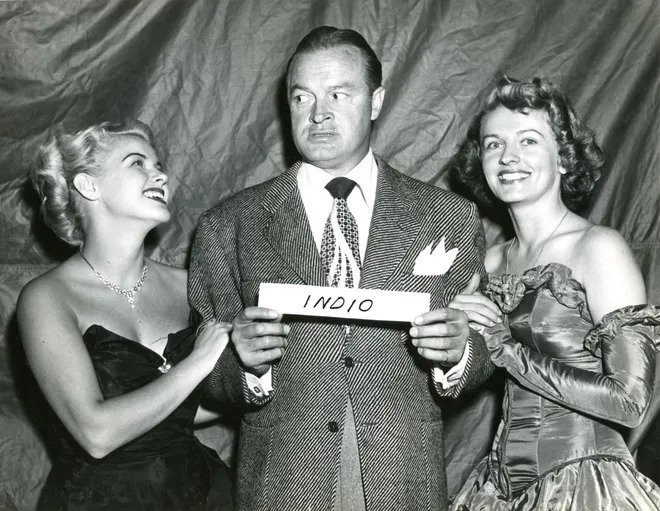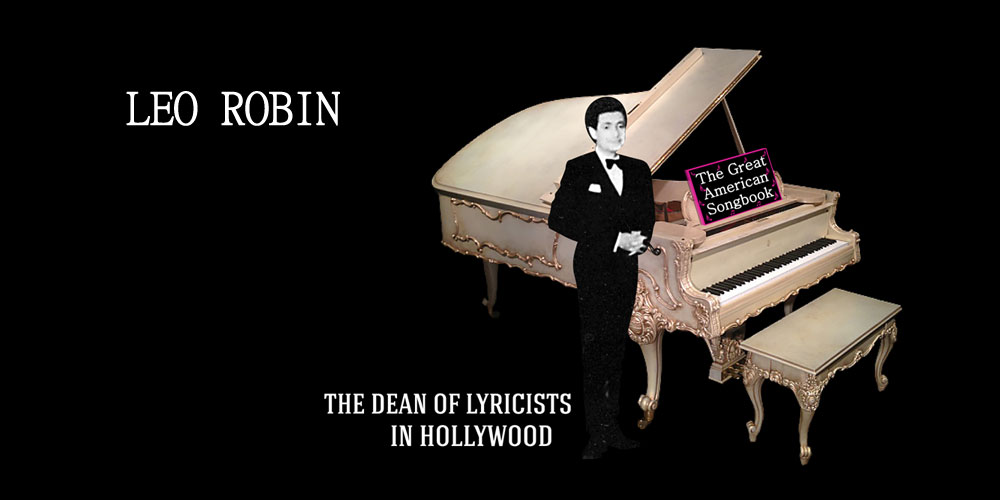An ode to the classic “Thanks for the Memory” is given by Tracy Conrad from the Palm Springs Historical Society in his delightful story History: On Memorial Day, it’s fitting to thank Bob Hope ‘for the memories’ appearing in the Desert Sun on April 29, 2022.

Bob Hope performs at an Indio charity event in the 1940s (Courtesy of the Palm Springs Historical Society)
The charming song was first introduced by Bob Hope and Shirley Ross in the movie, “The Big Broadcast of 1938.” It was Hope’s first film and he and Ross play a divorced couple who unexpectedly encounter each other aboard ship. They playfully and poignantly review their tumultuous relationship to the music that reflects life itself in many circumstances.
The song begins with its singular title, “Thanks for the Memory/ Of rainy afternoons, swingy Harlem tunes/ Motor trips and burning lips and burning toast and prunes/ How lovely it was!” If you aren’t familiar with the song, watch the restored clip of the scene at on YouTube.
Composed by Ralph Rainger, the melody is sweet without being overly sentimental. Each chorus lilts to a crescendo that is infectious and fun.
The song speaks to reflecting on life and is specifically associated with remembrance and memorial because Hope used it to close his USO military shows in every conflict from World War II through the Gulf War. In all, Hope made a remarkable and memorable 57 USO tours with the tune.
“It turns out one of dad’s writers had a brother who was stationed in March Field in Riverside, California. He said, ‘Why don’t you think about bringing your show out here? There’s lots of guys and I know they would love to see you.’”
After that very first performance Hope was dedicated to entertaining the troops for the rest of his life.
The attack on Pearl Harbor a few months after the March Field show caused Hope to try to enlist in the Armed Forces but he was in his late 30s and was told he could do more for the cause as an entertainer. He agreed and started a partnership with the USO that would last more than half a century. And each performance for those in uniform would be capped off with the song that won the Academy Award for Best Original Song in 1938 and became Hope’s signature for the rest of his life.
The clever lyrics written by Leo Robin are whimsical and tell the story of the resiliency of young love and life, “Many’s the time that we feasted/ And many’s the time that we fasted/ Oh well, it was swell while it lasted/ We did have fun, and no harm done.” One verse of the song conjures up the sophisticated couple’s honeymoon. Robin’s original lyrics were: “That weekend at Niagara when we never saw the falls.” The line was rejected by the film producers who feared it was too suggestive. Robin was furious and a bitter argument ensued. Finally, a compromise was reached that has Hope singing: “That weekend at Niagara when we hardly saw the falls.” The lyricist never forgave this censorship considering it ridiculously prissy and ruinous for the song.
However the whimsy continues in subsequent verses, “Thanks for the memory/ Of faults that you forgave/ Rainbows on a wave/ And stockings in the basin when a fellow needs a shave/ I thank you so much.”
The song is about gratitude even if things go wrong. “Thanks for the memory/ Of sentimental verse/ Nothing in my purse/ And chuckles when the preacher said for better or for worse” and “We who could laugh over big things/ Were parted by only a slight thing/ I wonder if we did the right thing/ Oh, well, that’s life, I guess.”
Further verses hint at the infidelity that perhaps caused the divorce, “Thanks for the memory/ Of gardens at Versailles/ And beef and kidney pie/ The night you worked and then came home with lipstick on your tie/ How lovely that was… We said goodbye with a highball/ And I got as high as a steeple/ But we were intelligent people/ No tears, no fuss, hooray for us!”
Many iterations and additional lyrics were adapted over the years to every situation and some feature celebrities known in the desert. In 1962 when Marilyn Monroe famously sang a steamy Happy Birthday to John F. Kennedy, she appended an additional verse sung to the melody of “Thanks for the Memory” that teased, “Thanks, Mr. President/ For all the things you’ve done/ The battles that you’ve won/ The way you deal with U.S. Steel/ And our problems by the ton/ We thank you so much.”
On Memorial Day, it seems fitting to think of Hope. He was responsible for focusing national attention on military service. Here in the desert, he helped build the tourist and golf industries, donated millions to charity and was an integral part of the community. His accomplishments are legion as he truly lived and played here.
On Memorial Day, many people in Southern California visit his bronze statue on Harbor Drive in San Diego called “National Salute to Bob Hope and the Military.”
Born Leslie Townes Hope on May 29, 1903, in Eltham, England, he and his family immigrated to Cleveland, Ohio when he was 4 years old, and he became a U.S. citizen in 1920. His is a quintessential American story. He worked as a newsboy, butcher’s assistant, shoe salesman, amateur boxer and vaudeville trooper and succeeded beyond the most extravagant dreams.
By the time of “The Big Broadcast” Hope was one of America’s most popular radio stars. Paramount Pictures cast him in the amusing film starring W.C. Fields where Hope got to sing “Thanks for the Memory.” It proved so popular, the following year Paramount cast Hope and Ross in a film named for the song but featuring a different tune sung by the pair, “Two Sleepy People” written by desert resident Hoagy Carmichael.
When the nation went to war in 1941, Hollywood pitched in by entertaining troops, raising funds, selling bonds and boosting morale. Hope led the way traveling throughout Europe and the Pacific with shows featuring starlets, comedy monologues, celebrity appearances, famous one-liners and the song.
In 1997 the U.S. Congress passed legislation naming Hope an honorary veteran. He was humbled, “To be numbered among the men and women I admire most is the greatest honor I have ever received.” Hope died in 2003, a few months after his 100 th birthday.
Memorial Day is an observance of gratitude for service men and women. Hope’s unparalleled acknowledgement of those who serve in the military is extraordinary and worthy of reflection, remembrance and gratitude.
The last verse in the song is an intimate review and appraisal of life in general, “Strictly entre nous/ Darling, how are you?/ And how are all those little dreams that never did come true?/ Awfully glad I met you/ Cheerio and toodle-oo/ Thank you/ Thank you so much.”
